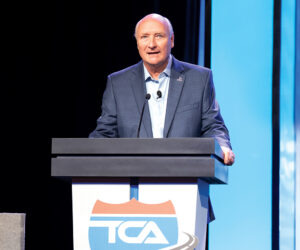WASHINGTON — The controversy between the trucking industry and individual states over state meal and rest break laws is moving up the West Coast to the state of Washington.
In less than a year since the Federal Motor Carrier Safety Administration granted petitions filed by the American Trucking Associations and the Specialized Carriers and Rigging Association and determined that California’s meal and rest break rules as applied to property-carrying CMV drivers subject to FMCSA’s Hours of Service regulations are preempted under federal regulations, the Washington Trucking Associations (WTA) has filed a similar petition.
The WTA is requesting a determination from the federal agency that Washington state’s Meal and Rest Break Rules (MRB rules) as applied to drivers of commercial motor vehicles subject to FMCSA’s HOS regulations are preempted by federal law.
Several other states have mandated meal and rest break laws, and since the petition FMCSA granted last year applied only to California, any other state trucking associations wishing to have their state laws preempted have to file their own petitions.
The WTA’s petition says that Washington state law requires employers to provide employees with a meal period of at least 30 minutes for every five-hour work period and a 10-minute break for every four-hour work period.
“While employees may not waive their right to a rest period at all, employees may waive their right to a meal break,” the petition said.
However, the WTA contends that “a missed [meal] break creates the presumption of a violation,
with the burden on the employer to prove waiver as an affirmative defense.”
In its petition, the WTA explained that “Washington’s rules contemplate a paid, on-duty 30-minute meal break when the employee is required by the employer to remain on duty on the premises.”
However, “even if the 30-minute break is paid pursuant to that provision,” the WTA argues that employers remain obligated to “make every effort to provide employees with an uninterrupted meal period” and to “continue the meal period until the employee has received 30 minutes total of mealtime.”
In its petition, the WTA alleges that, similar to California’s requirements, the Washington MRB rules are “regulations on commercial motor vehicle safety within the meaning of federal law and that they are additional to of more stringent than FMCSA rules.”
In addition, the WTA petition says that the Washington MRB rules have no safety benefit beyond those provided by FMCSA’s rules, are incompatible with the federal HOS regulations, and impose an unreasonable burden on interstate commerce.
“Given the similarity between Washington and California meal, and rest break rules, the agency’s analysis of California’s rules in its recent preemption order applies equally to Washington,” the petition concludes.
The FMCSA is requesting comments on the WTA petition.
To submit a comment online, go to www.regulations.gov and put the docket number FMCSA-2019-0128 in the “Keyword” box, and click “Search.”’ When the new screen appears, click on the “Comment Now!”’ button and type the comment into the text box in the following screen. Choose whether you are submitting your comment as an individual or on behalf of a third party and then submit.
Comments must be received on or before November 8.
Lyndon Finney’s publishing career spans over 55 years beginning with a reporter position with the Southwest Times Record in Fort Smith, Arkansas, in 1965. Since then he’s been a newspaper editor at the Southwest Times Record, served five years as assistant managing editor of the Arkansas Democrat-Gazette in Little Rock and from November 2004 through December 2019 served as editor of The Trucker. Between newspaper jobs he spent 14 years as director of communications at Baptist Health, Arkansas’ largest healthcare system. In addition to his publishing career he served for 46 years as organist at Little Rock’s largest Baptist church.








